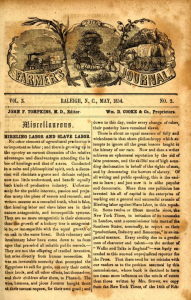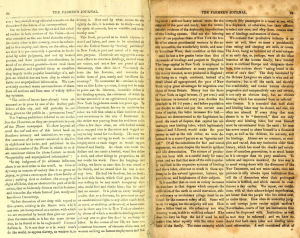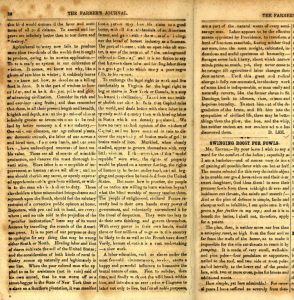Andie McKinnon
AMST 276
10/10

[May 1854], in the Farmer’s Journal, Vol 3, No. 2, North Carolina Digital Collections, State Library of North Carolina.

[May 1854], in the Farmer’s Journal, Vol 3, No. 2, North Carolina Digital Collections, State Library of North Carolina.

[May 1854], in the Farmer’s Journal, Vol 3, No. 2, North Carolina Digital Collections, State Library of North Carolina.
“Hireling Labor and Slave Labor”
The North Carolina Agricultural Society was founded in 1852; this society founded the North Carolina State fair, which was created in order to promote agriculture, both scientific and industrial. This society also published a Farmers Journal which remained in publication only from 1852-54. This primary source is taken from a chapter in the Farmers Journal issue of May 1854. In this chapter, John F. Tompkins, an agriculturalist and physician born in Edgecombe County, defends slave labor as a necessary faucet of agriculture.
Tompkins introduces his point of view on the topic of hiring slave labor by claiming that the opposing party’s “passion and prejudice usurp the place of reason and research, and writers assume as a conceded truth, what is false, that hireling labor and slave labor are in their nature antagonistic, and incompatible systems” (1). To Tompkins, hiring slave labor is a matter of natural human history; he points to examples of slavery throughout time, such as in Egypt, to support his claim that slavery is a total social fact of humanity. He refers also to the Jewish population, “being an indolent set of semi-savages” to further his claim that working involuntarily is for some a natural duty, and even goes on to state that involuntary labor is a “blessing in disguise” (9). He regards these instances as collective “great lessons of the history of our race” (2).
According to Tompkins, those belonging to the Union that oppose slavery are overcome by irrational, fiery passion, while those who support it are truly sober in judgement. Tompkins then uses an anecdote to demonstrate the consequences of freedom for an enslaved person: an escaped enslaved person from the South was found begging on the street for food or money in New York. Tompkins uses this example to argue that while this man may have his freedom, he does not possess any necessities such as money or bread to sustain his life, while when he was enslaved, he was provided food, clothing, firewood, and shelter. According to Tompkins, heavy annual taxes that support the poor are already too burdensome without the freedom and unemployment of former enslaved persons. Tompkins further goes on to defend the systematic operation of enslavement by insisting that flaws only arise due to “the natural ignorance, laziness, improvidence, and helplessness of their subjects” (8).
Finally, Tompkins wraps up his defense of maintaining involuntary labor by claiming that it has the capacity to humanize a “savage” man. He states: “Labor appears to be the effective means appointed by Providence to transform a herd of ferocious cannibals, fearing God nor man, into the most upright, cultivated, industrious and useful specimens of humanity… To start him out of the degradation of the brute… there may be better things than the plow, the hoe, and the whip, but neither ancient art nor modern science has discovered them” (12). This horrifying passage is then nonchalantly followed by a chapter on “Swinging Roosts for Fowls.”
This passage from the Farmers Journal produced in Raleigh tells us about the attitudes toward slave labor in the Central Piedmont region of North Carolina. Through this passage, we see an example of the nonchalant nature of brutality and cruelty regarding the enslavement of a people during this time. The fact that this column is sandwiched among other columns regarding milking a cow and “fire-fanged manure,” is even more telling about the attitudes of this topic. This column in the Farmers Journal therefor helps tell the Chapel Hill food story.